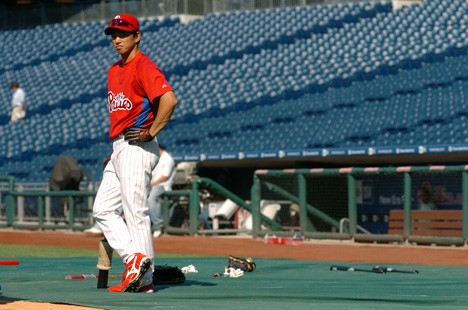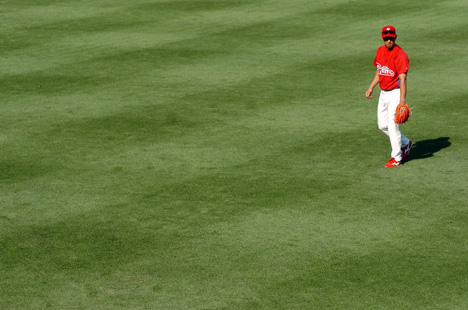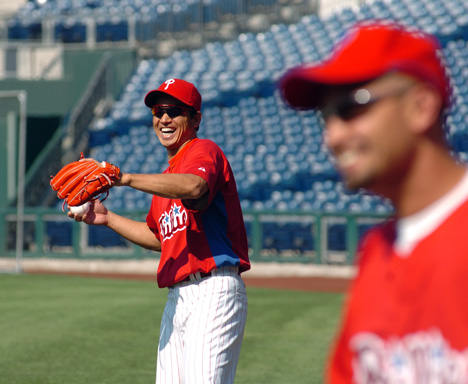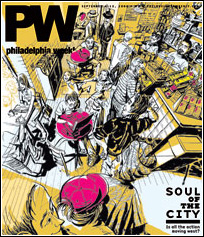So Taguchi Has Lost His Wa
But the Phillies' slumping outfielder remains determined to find it.
From the July 9, 2008 Philadelphia Weekly.

It's three hours before a game in early June and our heroes stand on the field, stretching, laughing, gazing at the glorious blue sky as though it's the first they've ever seen.
For the moment, they seem to appreciate this great fortune that allows them to grow rich beyond expectation by throwing hard, swinging accurately, running fast and tossing their bodies in front of objects moving at lightning-quick speeds.
Jimmy Rollins' cheeks bulge as he converses with Ryan Howard, the Bunyanlike figure holding a piece of boned lumber in his left hand. The two stand near the batting cage almost posing, as though someone's chiseling their likenesses in marble.
The Reds' Ken Griffey Jr., a future Hall of Famer currently sitting on 599 career home runs, approaches the league's two Most Valuable Players. They shake hands, tell jokes and double over in laughter. Mere mortals aren't permitted near the batting cage so it's impossible to hear what they're saying. No doubt they're discussing the state of their magical powers, their innate abilities to perform the inhuman tasks they execute every day.
Chase Utley, the leading All-Star game vote-getter who's hit a home run in each of the last five games, picks up his bat and practices his quick, majestic swing.
Players remain scattered along the first-base line. Gregg Dobbs lies on his back, his legs facing home plate while his head faces the outfield bleachers. Chris Coste, stonefaced, struggles his way through push-ups. Geoff Jenkins extends his arms in front of him as though he's trying to fly.
Farthest from the batting cage and slightly removed from the others stands So Taguchi. The boyish-looking Japanese utility outfielder leans on his left leg, stretching the right. His eyes are open wide but he seems not to be looking at anything.
He's alone, physically and mentally.

Taguchi's the 25th man on a 25-man team, and he's suffering through the most difficult season of his 17-year professional career. He's 7,000 miles from home, the only Japanese-speaking player on a team in a city without a large or active Japanese population. He barely gets to play.
On top of all that, he could lose his job any day now.
Yet there probably isn't anyone more excited to be on the field right now than Taguchi.
"This is the major leagues," he says with a huge smile after batting practice. "It's the best baseball in the world."
***
Right about now, the city's overheated sports bloggers, radio windbags and armchair general managers are smacking their heads.
"Taguchi? That's who you're profiling?"
Taguchi should be gone, they say, replaced by a young minor league stud like Greg Golson or T.J. Bohn. Taguchi is a defensive replacement who can't catch, a pinch hitter who's hitless in 16 attempts.
So Taguchi?
But complaints about Taguchi have quieted down lately, replaced by utter frustration over the team's recent 4-11 interleague performance, the pitching woes of Brett Myers and the inconsistency of the Phillies' offense.
Still, the pressure for the Phillies to reach the postseason remains as intense as ever. Roster changes will likely occur by the July 31 trading deadline, and many Phillies fans would welcome the trade or outright release of Taguchi, who turned 39 last week.
"I can't control that," he says. "If I think about what I can't control, it's not good for my mind."
Instead, every day he stretches. He takes batting and fielding practice, runs the bases, shags fly balls, does wind sprints on the warning track and works as hard as anyone on the team to mentally prepare for the moment when manager Charlie Manuel points to him.
It's all he can do.
Taguchi - who won five Gold Gloves in Japan while sharing an outfield with hit-machine Ichiro Suzuki and who played on two World Series teams with the St. Louis Cardinals - had only five official at-bats for the Phillies in June.
"He's very Japanese, very proud," says Katsushi Nagao of the Kyodo News, a Japanese wire service. "I'm sure he's upset about his plate appearances, but he'll never say that to the media, players or coaches."
In Philadelphia Taguchi is a stranger in the strangest of lands, and not just because he's Japanese. He's the ultimate team player, a man with no ego who just wants to see his team win. He respects the game and reveres the manager and is too polite to point out that he had more than three times as many at-bats by this time last year when he was with the Cardinals.
Before someone buys Taguchi a one-way ticket back to Japan, we should try to understand this person who's fallen in love with America and appreciates our national pastime so much. He might have something to teach us.
***
Former Saturday Night Live star Tim Meadows bounces the ceremonial first pitch to home plate, and the sold-out crowd showers him with boos.
Moments later, Adam Eaton takes the mound against the Cincinnati Reds.
Taguchi, who has deceptively broad shoulders, wanders around the bat rack with his arms folded. He studies Eaton and leadoff hitter Jerry Hairston. He watches every pitch throughout the inning, and when the regulars return to the dugout he retreats to the far end of the pit, near the camera well. He eventually moseys to the railing, drapes his arms over it and rests his chin on his right hand.
As Utley steps to the plate, the dollar-dog-night crowd begins chanting, "MVP!" In the last row of the right-field bleachers, "Romero's Sombreros" - a gaggle of five guys in oversized Mexican hats - cheer and dance. On the main concourse, fans stand three deep behind the disabled seating.
As the game progresses, Taguchi paces, occasionally sitting on the bench or fist-bumping a teammate, but never taking his eyes off the field, and rarely speaking.
Finally, after Pat Burrell strikes out with the bases loaded to end the seventh inning, Taguchi replaces him in left field.
Taguchi hustles out to left, his head down as he runs. Even his trot is unassuming. When he nears his position he slows to a walk, which has a side-to-side motion like a child who's just been scolded. He catches one fly ball but otherwise has a quiet evening in the field.
Taguchi doesn't get an at-bat in the game and his batting average stays at .203 (12 hits in 59 at-bats).
But the first-place Phils win and life goes on.
***
"It's the toughest role in baseball," says Charlie Manuel. "People definitely don't understand. When you don't get to play a whole lot, it's hard to be a good hitter."
When Manuel was a young player in Minnesota, he was in the same position: pinch hitter and backup outfielder.
"It's hard to get your timing," he says. "The pitchers get ahead of you. The stuff you see in batting practice is maybe 40 or 50 miles an hour. You get in the game and these guys are throwing 85, 90, 100 miles an hour, throwing breaking balls and change-ups."
In his first big-league season, Manuel had only 164 official plate appearances (starting players average more than 500) and batted .207. Through six seasons - four in Minnesota and two in Los Angeles - Manuel stagnated in the backup role.
After his 1975 season with the Dodgers - he had only two hits in 15 at-bats - Manuel signed a contract to play for the Yakult Swallows of the Nippon Professional Baseball League in Japan.
The fair-haired 6-foot-4-inch 200-plus-pound good old boy from the Blue Ridge Mountains had to adjust to life in a land of dark-haired petite people who speak a foreign tongue and play a different brand of baseball.
"I can understand what he's going through," Manuel says of Taguchi. "The only person he can probably talk to is his wife, and more likely he's not going to want to talk about his job or baseball to her."
***
In Japan Manuel was full of energy and emotion, and his ferocity showed in his red cheeks. The Japanese dubbed him "aka oni," the red devil.
"When I was in Japan, they always told me about Japanese style," Manuel remembers. "You're supposed to do like the Japanese do. At first that was kind of difficult for me. After about a year or so I kind of enjoyed it."
Baseball in Japan physically resembles our national pastime but the unspoken rules are different. If a runner is on first base with second base empty and less than two outs, the batter always bunts. Pitchers tip their cap after they bean a batter. Games can end in a tie. There were only two non-Japanese (gaijin) players allowed per team when Manuel was in the league (four are allowed now).
Win or lose, Japanese fans pack the stadiums for every game. They wear costumes, sing in unison, bang drums, wave banners and clap relentlessly. The players are idolized.
The owners regulate the players' lives - they're the ones who represent the brand, after all. Extracurricular activities are restricted. Grandstanding is not allowed. Pregame exercises are stringent and mandated. There are no excused absences from games. Sadaharu Oh, the world's all-time home-run king, skipped his father's funeral because the Tokyo Giants were on the road.
In Japanese, spoken statements (tatemae) are frequently different from their true intention (honne). It's a method to avoid embarrassing situations and maintain harmony (wa).
"The biggest thing I learned in Japan was to respect people and the things around me," Manuel says. "I learned there are more things than me in the world. From a coaching standpoint, those are the greatest things I brought from over there. I learned how to communicate more with people and also to have more respect for people."
In six seasons Manuel won three league pennants, a Japan Series championship and the 1979 Pacific League MVP award. He clubbed a league-leading 48 home runs in 1980.
"He was like Mickey Mantle to us, believe it or not," says Nagao, the Kyodo News writer.
***
Taguchi essentially sits out the remainder of the Phillies' four-game homestand against the Reds, as well as most of the nine-game roadtrip through Atlanta and St. Louis. He steps to the plate only twice, both times during the Phillies' 20-2 rout of the Cardinals.
He strikes out the first time but the St. Louis crowd gives him a standing ovation: Here, Taguchi is still a pinch-hitting hero.
In 2006 he smacked a pinch-hit home run during game three of the division series against the San Diego Padres. During game two of the National League Championship Series against the New York Mets that same year, he belted a tie-breaking pinch hit solo home run off Billy Wagner in the top of the ninth. He hit a two-run pinch-hit double off Wagner in the top of the ninth during game six of the same series.
Taguchi batted .400 during the Cardinals' 2006 championship run, collecting six hits in 15 at-bats. He started three of the five World Series games against Detroit.
In 2007 he had 13 pinch hits in 32 at-bats for the Cards, the best average in the National League.
"It was a long standing O," says Phillies centerfielder Shane Victorino, who's one-quarter Japanese. "That was really an honor."

In Taguchi's second at-bat against his former team, he singles up the middle. The crowd again jumps to its feet.
"It was an awesome night," says Taguchi, who's the only Japanese player in the major leagues who doesn't employ a translator.
"I couldn't hold my tears," says Taguchi's wife Emiko.
***
The hordes of Japanese media who document the every move of ballplayers like Ichiro Suzuki, Hideki Matsui and Daisuke Matsuzaka generally snub Taguchi.
He's not an everyday player and he's not flamboyant. The only time they cover him is when he's playing against a team with a Japanese superstar. It's called tsuide - taking advantage of an opportunity. It's a word with negative connotations.
When the Boston Red Sox arrive at Citizens Bank Park in mid-June, tsuide is on Taguchi's mind.
Still, he follows his rigorous pregame ritual, ignoring the handful of Japanese cameramen and reporters who follow the Bosox. Most of the Japanese media have gone to Allentown to watch Matsuzaka make a rehab start against the Iron Pigs.
It's only when Taguchi greets the Red Sox's relief pitcher Hideki Okajima near the batting cage that the cameras come to life.
"I say to Okajima, 'Let me hit!'" Taguchi later jokes.
But as usual Taguchi experiences the playoff-like atmosphere only from the bench for most of the game. He enters as a pinch runner for Burrell in the bottom of the sixth but doesn't get to bat. The Phillies win 8-2. The closest Taguchi gets to home plate is the on-deck circle with Okajima on the mound in the bottom of the eighth.
"I don't get a lot of at-bats," Taguchi says. "I have to keep my feelings fresh. Everyday players have to adjust from at-bat to at-bat. I have to adjust during each at-bat, from pitch to pitch. It's a new challenge."
In Japan Taguchi started nearly every game, batting second behind Suzuki for the Orix BlueWave, Taguchi's hometown team. Both players were drafted in 1992: Taguchi as the team's No. 1 one pick and Suzuki at No. 4.
"They made one of the best outfields in Japanese baseball history," says Nagao.
Taguchi and Suzuki covered massive territory - and had fun doing so.
"Usually we know which guy is going to catch the ball," Taguchi says. "Sometimes Ichiro yelled, 'Snake!' to scare me away."
Early in their careers, they made a pact to attack the first pitch of their first at-bats of the game.
"See the ball, hit the ball!" Taguchi says. "That's it. We both hit doubles on first pitch one game."
They impressed themselves so much, they tried it again the next game.
"Next time, first pitch, Ichiro pop out," Taguchi remembers with a laugh. "Me? First pitch, pop out. I think other players got mad. So we stopped."
The two stars led the BlueWave to a league pennant in 1995 and won the Japan Series in 1996.
Over 10 seasons Taguchi batted a consistent .277, amassing 1,134 hits in 1,107 games.
Suzuki became the first Japanese-born position player in the major leagues in 2001. He recorded 242 hits that year and won the American League rookie of the year and MVP honors.
Taguchi arrived in St. Louis one year later but spent most of 2002 and 2003 in the minor leagues.
***
Sporting a lavender dress shirt and black slacks, Taguchi waits behind the VIP rope at the Jimmy Rollins BaseBowl Tournament at Lucky Strike.
On the other side of the guarded entrance Pat Burrell, half the Flyers' front line, the Soul cheerleaders, Bobby Bonilla, Ron Jaworski and numerous other celebrity athletes mingle inside the dim alley with hip-hop blasting over the sound system.
"Security guard said, 'Stay here,'" Taguchi says.
He stands patiently for 15 minutes as other celebs walk in and out of the restricted area.
Finally, Taguchi's wife Emiko tells the guard, "He's a ballplayer."
The guard answers, "Which team is he on?"
"Nobody knows him here," his wife says later as her husband of seven years bowls for charity.
The couple live anonymously in Philadelphia with their 4-year-old son Kan and two Chihuahuas. They rarely hit the town. Taguchi spends most of his time either with the team or exercising.
"During the season, he's the king," says Emiko, a former Japanese broadcast sports anchor. "He provides the food and shelter. I do whatever he needs me to do."
She cooks and cleans and even carries his equipment and luggage. Once, when Taguchi was with the Cardinals, eight of the players' wives wagged their fingers in his face and chided him for allowing Emiko to carry his stuff.
"You have to respect Emiko as a woman!" they snapped.
Taguchi simply smiled and nodded deferentially.
"He was so scared," Emiko remembers with a laugh.
Taguchi studies English every day - up to four hours a day in the off-season. His miscommunications - like when he thought his Bible study instructor was talking about rolled king salmon sushi when she mentioned old King Solomon - have become less frequent. It seems a lifetime ago when he thought Cardinals skipper Tony LaRussa was talking about calisthenics when he told the team they had to prepare for a long road stretch.
"My English is still bad but I can speak English," Taguchi says with pride.
At Lucky Strike he continues bowling despite despising the game. For some reason he's wearing a sagging backpack with the tags poking his head.
"I don't know why," Taguchi says quizzically. "Someone handed it to me, said to put it on."
Behind him, Emiko hugs Chase Utley's wife Jennifer.
"Thanks so much for the sake," Jennifer says.
When the Utleys told Emiko they'd never tasted sake, she had a few bottles shipped to them from Tokyo.
"So's a great teammate," says Chase, who studied Japanese briefly in high school. "He's quiet but very focused."
***
It's the third week of June and top of the ninth inning. The Phillies are down 4-2 to the Los Angeles Angels. Taguchi roams left field, having entered the game as a pinch runner after Burrell walked in the eighth.
This has become Taguchi's role: defensive replacement. He needs to help make sure the Angels score no more runs so the offense can perform their magic in the bottom of the inning.
And then the walls come crashing in.
Angels catcher Jeff Mathis lofts a high pop fly toward the left-field line, almost on the warning track. Taguchi races to his right to catch the ball but overruns the spot. At the last moment he lunges back and misses the ball.
Two runs score that inning and boos cascade from the stands. The Phillies go on to lose 6-2.
The next day the media focuses on Brett Myers' performance in the game - he served up three solo home runs. Taguchi's error barely gets mentioned.
"It was big deal for me," Taguchi says the next morning. "I couldn't sleep last night."
The next day only gets worse.
With two outs in the bottom of the ninth and the Phils down 3-2, pinch hitter Taguchi slaps an out-of-the-strike-zone 2-0 pitch into the air in foul territory. Angels third baseman Chone Figgins easily snags the ball, ending the game.
Taguchi had a chance to be a hero. Instead he leaves two men on base and Chase Utley standing in the on-deck circle.
"It's frustrating," Manuel says immediately after the game.
Over the next two weeks Taguchi doesn't see much action. Eric Bruntlett pinch runs and takes left field one game, Jayson Werth another.
Taguchi watches his role on the team diminish. Then this past Monday night, he strikes out looking.
"The truth is, he's very upset," his wife says. "But he understands why he's here - to do the best for the team."
The question now is: What exactly is best for the team?
"He's not worried about being cut," Emiko says. "He's worried about being fossilized."









